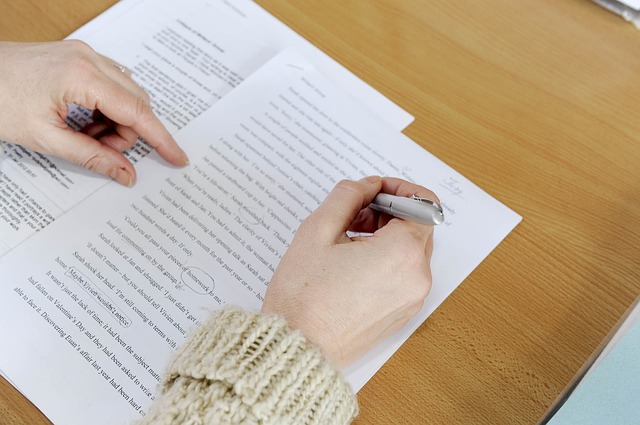Discussion chapter of a PhD thesis focuses on explaining and analyzing what you have researched, presenting how it is associated with the existing literature. It is also a place for argument supporting your entire discussion. We often find that people seek thesis writing help from experienced editing and proofreading services to prepare a flawless PhD discussion chapter. However, following 9 essential tips can help you design a perfect PhD thesis with an excellent discussion chapter.

This article provides 9 effective tips for writing a flawless discussion chapter for a PhD thesis. To give you an opportunity to practice proofreading, we have left a few spelling, punctuation, or grammatical errors in the text. See if you can spot them! If you spot the errors correctly, you will be entitled to a 10% discount.
Writing a flawless PhD thesis requires much more than only subject matter expertise. It requires expertise, experience, and in-depth thinking, along with sharp intelligence. Though most students add a discussion chapter in their thesis or dissertation, many of them end up messing up the essay or missing out the central issues.
A discussion chapter in a PhD thesis is a place where you have the chance to delving into the analysis, importance, and relevance of your research. This section focuses on explaining and analyzing what you have researched, presenting how it is associated with the existing literature. It is also a place for argument supporting your entire discussion. We often find that people seek thesis writing help from experienced editing and proofreading services to prepare a flawless PhD discussion chapter. However, the following 9 essential tips can help you design a perfect PhD thesis with an excellent discussion chapter.
Before setting out to conduct a PhD thesis, researchers design and plan a study with objective(s) in mind. Such objectives inform how the dissertation is conducted. For example, no researcher would just commence by administering questionnaires or setting up laboratory equipment without an objective. It also informs the questions and necessary procedures to undertake. To write a well-conveyed discussion section in PhD thesis, the author must review and ascertain whether the conducted study addressed these objectives. It takes the understanding of the objective to assess the achievement of the objective clearly. Based on the assessment, the author finds the direction of his discussion. The comprehension of this objective is critical to crafting a focused discussion section in scholarly writing.
The first step in organizing a perfect discussion chapter for a PhD thesis is to divide them into separate sections that move from a particular result to implications. However, depending on your PhD thesis topics, you may utilize the followings:
Analyze and summarize your main findings.
Evaluate how the results reflect the literature review.
Show if the discussion impacts the original hypothesis and, if yes, how it affects your hypothesis.

The proper usage of grammar and tense is a key to a seamless PhD thesis. The improper use of grammar and tense can have the worst impact on the entire dissertation, along with the discussion chapter. Depending on the context, the usage of past and present tense should be made. When you are referring to specific data, the present tense can be used. For instance, when the light increases, speed decreases. However, while summarizing the result or concluding something, past tense can be used. For example, between 2013 and 2016, the number of car accidents decreased visibly. However, depending on the context, you can combine two tenses. Also, bear in mind that different manuals might require different tenses.
The tense adopted by the study should be uniform. Try to write the discussion chapter of your PhD thesis in the required tense format of your guideline. For instance, The APA Publication Manual provides suggestions on which verb tense is appropriate for various sections of a thesis:
Past tense or present perfect tense for the literature review and "the description of the procedure if the discussion is of past events."
"Use past tense to describe the "
"Use the present tense to discuss the implications of the results and to present the conclusions. By reporting conclusions in the present tense, you allow all readers to join you in deliberating the matter at hand."
As much as possible, try to be consistent with your chosen verb tense within a section as doing so "can help ensure smooth expression."
It is always best to check with your manual to get their opinion on the best approach for your thesis.
The primary purpose of referring to the literature review is to contextualize your discussion chapter as a part of the debate. For instance, suppose you introduce a theory claiming that speed cameras have zero effect on a road’s fatalities. You need to describe how your findings relate to this assumption. The same applies while making a hypothesis. Never forget this fact while discussing your results.
While writing the discussion chapter of your PhD thesis, you need to analyze your results rather than just simplifying it. Don’t forget to do complete research on if your results agree or conflict with the previous studies. You need to evaluate if there are any differences and, if yes, what the differences are. Comparing the development with existing studies helps your research to connect any existing debate. It also offers a solid base of conclusions.
In a well-written discussion chapter of a PhD thesis, an author should compare his/her findings with those of other studies reported in the literature. This aspect is different from a literature review in the sense that the author has data at hand to compare, as against the general overview made about a thesis’s objectives prior to the investigation. In comparing, the author is able to pronounce the authenticity of the results, especially when similar procedures were used in other studies. Any differences in findings can be explained using the different peculiarities between the author’s study and others. If this consideration is carefully made and implemented, the author may likely find evidence-based explanations for his/her findings. Even for novel findings, an author may still find relevant literature that formed the rudiments of the present study to discuss the progress, contribution, and novel dimension of the study.

After discussing the study results, the author, as part of his goal, must propose the impact of the study’s findings on the problem that informed the idea of the thesis. The reader will be better served if the author describes a roadmap for solving the problem based on the findings. Depending on the nature of the problem, an author may propose solutions to affect policy, behavioral change, or conventional practice. Only after making this contribution will a discussion section expose readers to the specific and general impacts of a PhD thesis.
It is one of the most important things to evaluate when writing a discussion chapter for your PhD thesis. The discussion chapter of your research paper should involve some acknowledgment of the study limitations. Suppose you have critically assessed similar studies in the literature review; you are free to compare your work against their weakness or strength.
The focus on research may change and evolve with time if you are working on a long-term project. The key to adjusting the focus on the literature review is to reflect these changes. Suppose you may find that specific themes are more prominent than others; it is helpful if you review your literature review and tweak them to emphasize the themes. Never be afraid to be unique to bring the changes.
Last but not least, you can seek assistance from professional editing and proofreading services. Taking PhD thesis help from professional editing and proofreading services doesn’t only facilitate the writing process but also helps you execute a flawless PhD thesis with a well-formed and informative discussion chapter. When highly qualified writers take responsibility for your research paper, you don’t need to worry about structure, consistency, flow, tone, grammar, and accuracy.
Writing a PhD thesis is not an easy task. However, systematic thinking and structure can make the process easier. From the introduction to the demonstration of your argument, literature review, and analysis of the result, everything is vital to prepare an outstanding PhD thesis. However, if you want to seek assistance from a professional editing and proofreading service provider to write a seamless discussion chapter and thesis, feel free to contact us. We will be happy to help you.
If you need thesis/dissertation editing or proofreading, our services are always credible and highly approved by recognized scholars and researchers. Our editing and proofreading experts adhere to all the guidelines and rules from all eminent universities. All the editors and proofreaders are seasoned doctorally qualified scholars with experience in editing and proofreading manuscripts. Therefore, any students can avail of unmatched thesis editing and proofreading service from Best Edit & Proof.
Best Edit & Proof expert editors and proofreaders focus on offering manuscripts with proper tone, content, and style of academic writing, and also provide an upscale editing and proofreading service for you. If you consider our pieces of advice, you will witness a notable increase in the chance for your research manuscript to be accepted by the publishers. We work together as an academic writing style guide by bestowing subject-area editing and proofreading around several categorized styles of writing. With the group of our expert editors, you will always find us all set to help you identify the tone and style that your manuscript needs to get a nod from the publishers.
You can also avail of our assistance if you are looking for editors who can format your manuscript, or just check on the particular styles for the formatting task as per the guidelines provided to you, e.g., APA, MLA, or Chicago/Turabian styles. Best Edit & Proof editors and proofreaders provide all sorts of academic writing help, including editing and proofreading services, using our user-friendly website, and a streamlined ordering process.
Kindly visit our order page if you want our subject-area editors or language experts to work on your manuscript to improve its tone and style and give it a perfect academic tone and style through proper editing and proofreading. The process of submitting a paper is very easy and quick. Click here to find out how it works.
Our pricing is based on the type of service you avail of here, be it editing or proofreading. We charge on the basis of the word count of your manuscript that you submit for editing and proofreading and the turnaround time it takes to get it done. If you want to get an instant price quote for your project, copy and paste your document or enter your word count into our pricing calculator.
Contact us to get support with academic editing and proofreading. We have an active live chat module to offer you direct support along with qualified editors to refine and furbish your manuscript.
Follow us on Twitter, LinkedIn, Facebook, Instagram, and Medium.
For more posts, click here.
How to Determine Variability in a Dataset
14.10.2023
How to Determine Central Tendency
19.02.2023
How to Specify Study Variables in Research Papers?
14.01.2023
Population vs Sample | Sampling Methods for a Dissertation
14.01.2023
How to Ensure the Quality of Academic Writing in a Thesis and Dissertation?
04.12.2022
How to Avoid Anthropomorphism in Your Dissertation?
04.11.2022
How to Write a Research Methodology Section for a Dissertation and Thesis
07.08.2022
How to Write a Theoretical Framework for a Dissertation and Thesis?
05.08.2022
How to Write Literature Review for a Dissertation and Thesis
02.08.2022
How to Write a Dissertation and Thesis Introduction
31.07.2022

For writers starting, paraphrasing might seem quite a difficult thing to master. However, everything can become better with practice and some good advice. Therefore, if you are getting into the world of academic writing and want to know how to paraphrase like a pro, we have a few tips that you might find helpful. This article discusses the basic steps of successful paraphrasing.
Continue Reading
A good part of any research depends on the right questions asked. If you are asking wrong questions, your entire research may go off track. Therefore, understanding what questions you need to ask is essential for your research. If you are on the way to your research but don’t know how to start framing the right research questions, we have just the right information for you. This article discusses the process of formulating research questions.
Continue Reading
Starting an academic study can be an overwhelming task. After all, it is a very systematic way of studying and involves many procedures and methods that you cannot skip or go around. One of the most prominent parts of research is the research methods that you adopt to get your results.
Continue Reading
Being a proofreading and editing service provider, we often find researchers making common citation mistakes in their research papers. Well, making mistakes is normal, but repeating the same mistakes is not accepted. Recognizing the gravity of the situation, we here bring the list of common errors students and researchers make while citing sources.
Continue Reading
Academic writing is an intricate task. Add to this the troublesome misconception surrounding it and things seem much more unwelcoming than they already are. Almost every high-school student, college student, and/or research scholar has come across and maybe fallen for certain writing myths and burdened themselves with unneeded knowledge. In this article, we will look at 6 common myths that you should avoid in academic writing.
Continue Reading
After writing your manuscript, you may likely decide on an editor to perform the final checks on your document. Mostly, authors make the mistake of sending their manuscripts to their editors, without providing adequate information about specifications on the service they seek. With such limited information, your editor may produce an unsatisfactory job with limited information at his/her disposal. Thus, to ensure that your editors provide the best possible service, which will prevent journals from rejecting your manuscripts on the grounds of noncompliance to journal requirements, the following information should be provided beforehand.
Continue Reading
Writing a research paper involves scrutinizing a plethora of research material to bring forth plausible conclusions. However, no matter the degree of impeccability and thoroughness of the research, successfully transmuting it into words takes a grave amount of practice and endurance. Thus, it is not uncommon to see amateur and even veteran scholarly writers commit research writing mistakes in their papers now and then. Following the narrative, this article will describe 5 research writing mistakes that frequently blemish the works of academic writers. It will also shed some much-needed light on the tips to amend and avoid these mistakes.
Continue Reading